#marcos hitler diktador tuta
Photo

Prometheus Unbound
I shall never exchange my fetters for slavish servility. ‘Tis better to be chained to the rock than bound to the service of Zeus.
-Aeschylus, Promytheus Bound
Mars shall glow tonight,
Artemis is out of sight.
Rust in the twilight sky
Colors a bloodshot eye,
Or shall I say that dust
Sunders the sleep of the just?
Hold fast to the gift of fire!
I am rage! I am wrath! I am ire!
The vulture sits on my rock,
Licks at the chains that mock
Emancipation’s breath,
Reeks of death, death, death.
Death shall not unclench me.
I am earth, wind, and sea!
Kisses bestow on the brave
That defy the damp of the grave
And strike the chill hand of
Death with the flaming sword of love.
Orion stirs. The vulture
Retreats from the hard, pure
Thrust of the spark that burns,
Unbounds, departs, returns
To pluck out of death’s fist
A god who dared to resist.
- Ruben Cuevas
47 notes
·
View notes
Text
These elections are a good parallel to the marcos and duterte regimes.
My family's experience was okay - we endured very long lines and waiting times but we were able to vote without incident.
In many other places, voters were disenfranchised: vote-counting machines that malfunctioned and prevented voters from submitting their ballots for hours (or for the entirety of the voting period), staff or poll watchers insisting or even harassing people into leaving their ballots to them, violence that resulted in people being killed and destroyed ballots and machines, shaded ballots (with Leni Robredo being shaded) being destroyed many instances of election-related fraud correlating with regions where Leni Robredo had more support - and the Commission on Elections insisting that the elections were generally peaceful and clean.
Just because my election experience was peaceful doesn't mean it was peaceful everywhere. Just because my family's experience during the duterte regime was peaceful doesn't mean it was peaceful everywhere. Just because my parents' experience during martial law was peaceful doesn't mean it was peaceful everywhere.
#never forget#never again#no to marcos duterte#marcos hitler diktador tuta#marcos magnanakaw#comelec palpak#comelec duwag#comelec kurap#halalan 2022#philippine history#historical revisionism#Philippines#akin
8 notes
·
View notes
Text
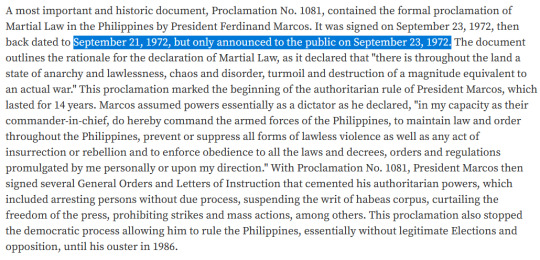




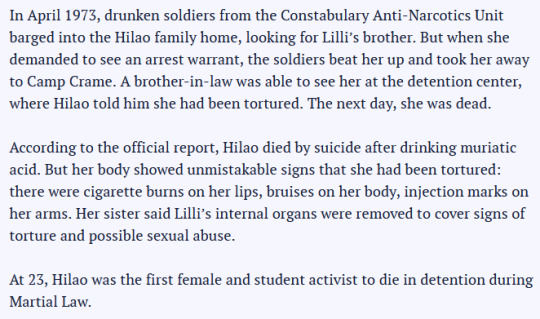



MARCOS HITLER DIKTADOR TUTA
there is no justice at the expense of the filipino people
Martial Law Proclamation Summary from the MARTIAL LAW MUSEUM & LIBRARY / header of Proclamation No. 1081 / Dark Legacy: Human Rights Under the Marcos Regime, Alfred W. McCoy / On the Eve of Dictatorship and Revolution, Petronilo Bn. Daroy / Never Again, Raissa Robles / Gone too soon: 7 youth leaders killed under Martial Law, Katerina Francisco / #NeverForget the killing of Archimedes Trajano, Antonio Montalvan II / from a newspaper article with headline of President Marcos declaring Martial Law / On Repentance and Repair, Danya Ruttenberg
#im so fucking furious about this. again and again and again!!!!!!!!!! they keep trying to cover up what they did!!!!!!!!!!!!!#martial law history#god i cant even articulate how much anger i feel about this. the way they're blatantly engaging in historical revisionism#where's the justice!! for the martial law dead! the tortured! the disappeared whose bodies we never found and could never bring home!!!#WHAT JUSTICE FOR THEM!!!!#philippine history#comparatives tag
62 notes
·
View notes
Text
prometheus unbound
Another CW assignment where we had to create one long and sustained sentence. This was inspired by the literary work with the same title (written by Ruben Cuevas), a seemingly innocent poem that turned out to be an acrostic spelling out “MARCOS HITLER DIKTADOR TUTA.”
--
prometheus unbound
One day, perhaps a sunlit one — with the warmth of daylight licking at the skin of people who are blithely unaware, teasing, deriding, mocking them for not having the forethought to predict what was to come; or maybe a stormy one — with accompanying lightning and rainstorms to foretell the incoming chaos, enough to shake people to their cores — if only such warnings were not drowned by the resoundingly malevolent thunder; but most likely a tranquil one — silent in its malice and swift in its retribution, Mount Elbrus will erupt, unshackling the crafty god of fire, reeking of death, the embodiment of rage and ire bottled from centuries of being bound and humiliated and tyrannized — whom the stars will watch with awe from above, from whose wrath will the vultures hide, whose roars will cause men to cheer and women to mourn, and whose fury, centuries of pent-up anger exploding and burning, will destroy everything in his path, stripping the Earth of its dirty glory, painting the gray skies red and freeing other colors from their dismal dens before he, strengthened by fire and kissed by the wind, can be fully liberated from his rage, freed from his oppressors, and emancipated from his woes — signaled by the shaking of the Earth, the lamenting of the seas, and the flight of the gods — then, there will be only love in his beaten-but-still-beating heart, as well as an overwhelming desire to start anew, to give birth to a world where the same evils could not grow, and to be the god of a new world where there will be no more gods (for with contentment in his heart, he can finally choose to wane and get eternal rest – after all, what need will a new world have for a tattered and downtrodden being like him) — but alas, for now, the freedom of the god of fire can only be a dream for a few, a hopelessly hopeful few, because for such day to come, blood, enough to cover the face of the Earth, enough to drown the blind and the ignorant, and enough to topple over the highest seats of power, must be spilled.
0 notes
Text
I shall never exchange my fetters for slavish servility. ’Tis better to be chained to the rock than be bound to the service of Zeus. --Aeschylus, Prometheus Bound
Mars shall glow tonight,
Artemis is out of sight.
Rust in the twilight sky
Colors a bloodshot eye,
Or shall I say that dust
Sunders the sleep of the just?
Hold fast to the gift of fire!
I am rage! I am wrath! I am ire!
The vulture sits on my rock,
Licks at the chains that mock
Emancipation’s breath,
Reeks of death, death, death.
Death shall not unclench me.
I am earth, wind, and sea!
Kisses bestow on the brave
That defy the damp of the grave
And strike the chill hand of
Death with the flaming sword of love.
Orion stirs. The vulture
Retreats from the hard, pure
Thrust of the spark that burns,
Unbounds, departs, returns
To pluck out of death’s fist
A god who dared to resist.
Ruben Cuevas, “Prometheus Unbound*” (Published in Focus Magazine, 1973)
*The poem “Prometheus Unbound” was sneakily published by Jose Lacaba under the pseudonym Ruben Cuevas in the Marcos-ally Focus Magazine on 1973. The beginning of each line spelled MARCOS HITLER DIKTADOR TUTA, a popular chant used in protests against the Martial Law. He was later arrested and tortured upon the discovery of the hidden words.
Rage on.
84 notes
·
View notes
Text
pag-agos (e/é)
left tumblr five years ago and came back because of the quarantine; she’s an aspiring journalist and he’s as angry as ever.
oneshot. au: 1970s martial law, philippines. tw: implications of police brutality, state oppression, and an explicit mention of death.
her eyes ran down the list in front of her.
soliven. mitra. diokno. aquino. all whisked away by the dictatorship, led to God-knows-where.
they won’t even spare the rich, she thought, a sick feeling forming in her stomach. she addresses ‘the rich’ as if she weren’t part of that lot, having grown up in a family that hailed from a line of indios but made their way to the top – albeit through deplorable, corrupt means. she knew of her father’s schemes as the mayor of a nearby town, then the graft that was committed to make him a head officer for the philippine constabulary; it made her sick to her core.
the singing of angry students floated to her ears. “marcos hitler diktador tuta! marcos hitler diktador tuta!” she heard them from afar, as if they were ghosts – but her eyes were too fixed on the list to care.
“i can’t believe they got soliven.” was all she managed to say. max soliven was a known journalist and the founder for the Philippine Star. he was also an avid pro-democratist; as a fellow journalist and pro-democratist herself, éponine adored him – she always did her best to channel him and primitivo mijares when she wrote her articles for The Guidon.
she looked up, meeting the fair skin and deep hazel eyes of the burgis boy in front of her. burgis, a twisted take on the bourgeois of the french – but that may as well be who he was. a fair-skinned burgis boy from Forbes Park, raised with a cobblestone driveway and marble floors. he had a whole portfolio of haciendas waiting for him at the end of his college career.
“i know,” he said, his voice quiet. “they got diokno, too.”
éponine knew how much enjolras adored pepe diokno, the attorney that actively spoke out against the cruel dictatorship; but underneath the grief from the attorney’s disappearance, she heard his fear. if they aren’t afraid of the rich, they can get his family too, she thought. burgis as he was, enjolras was raised by a woman that unabashedly spoke out against the regime; she was the one who inspired him to be the tibak that éponine knows him as today.
he straightened his back and he cleared his throat. “there’s going to be another rally in manila today.”
she felt her heart fall to her stomach. she wanted to say, please don’t–don’t go, don’t leave; they can get you, too, but his hard tone was telling her that he wasn’t asking permission. “so i’ve heard,” she said instead. she refused to look at him; he already looked translucent under the monsoon winds and dwindling manila heat.
“i’ll be leaving soon,” he said. “jean’ll be taking us there. this rally is organized by Lasallites, so the rendevous will be in front of their main hall. we’ll be marching to the Malacañang from there.”
you’re crazy, she thought. they’ll get to you before you even set foot out of malate.
“bring some water with you. that’s gonna be a long walk,” she said, her voice clipped. she couldn’t bear to see his face, already pale to her. after a long silence, he said, “okay.”
he’ll come back to me, she told herself. there’s no point in saying goodbye.
she heard him get up from the bench, the shuffling of feet and rustling of bags too painful for her to bear. before he could walk away, he said, “see you tomorrow, ép.”
“you better, you asshole.”
she heard him chuckle and willed herself to look his way. he was already jogging over to the group of student activists – so young, they’re all so young – chanting, “marcos hitler diktador tuta!”
the last she saw of him was jean clapping his shoulder, signaling that they had to go. he didn’t look back – he never did, because he was icarus and he always willed his wings to bring him closer to the sun.
*
when she saw jean on campus the next day, on crutches with a broken nose and a swollen lip, she almost keeled with dread. “where is he?” she asked him, eyes glinting with worry and fury and – please please please don’t let it be – growing grief. jean was silent.
“jean, where is he?” she repeated, louder and twisted with anguish. i refused to look at his face before he left, she thought. i need you to tell me i could see him again.
“i’m sorry, éponine.”
she felt the blood drain from her body.
“metrocom shot at whoever resisted. i tried grabbing him, taking him away before he got hurt – but you know how stubborn he is.”
all she could do was nod. jean nodded his head in return, a quiet apology and a condolence she didn’t want to hear. when he was out of sight, she ran.
she ran and ran, letting her feet carry her. she ran until she couldn’t, and when she collapsed, she screamed.
“you told me you’d come back!” she wailed. “it was a promise, you asshole! you promised me!”
she felt someone hold her from behind. with her last bit of hope, she whirled around, hoping to see the hazel eyes that she desperately needed to hold onto because he can’t be gone.
instead she saw ferre, his best friend.
“he promised me, ferre,” she said, her tiny voice cracking. “he promised me he’d see me today.”
she couldn’t bear to see the onlookers, friends and school mates who were silently grieving with her.
“he died for all of us, ép. he died for you.”
*
she hadn’t attended a rally since. even though she became the most ferocious political journalist of the Philippine Star, she refused to attend any of the demonstrations that littered the city –
(bring them home, please, bring them all home, she prayed, every time her friends went to battle. to her relief, they all managed to come back, though each time more battered than the last.)
– but the news of aquino’s death was the last straw.
in the haze of her rage she found herself throwing articles of marcos’ downfall like fireballs. whispers of enrile’s and ramos’ accession to the people soon became cries for revolution, and the next time her head cleared, she was already marching down Epifanio de los Santos Avenue.
when she found herself face-to-face with the barrel of a gun, she raised her chin, met the soldier’s eyes, and lifted her hand in an ‘L’.
“laban,” she said, in memory of him.
#enjonine#otp: the privilege is mine#quarantumblr#i needed to get this off my chest even if that meant reviving this blog after 5 years#fickle
9 notes
·
View notes
Text
Marcos’ martial law episode on #HistoryTV5. Reminder that martial law allows for media control and just because you didn’t experience the atrocities doesn’t mean they did not happen. Also Marcos was a fucking dictator who robbed the country so his family could live like royalty.
0 notes
Text
📷
THE MARCOS-ERA RESISTANCE POEM THAT SMUGGLED A HIDDEN MESSAGE INTO STATE MEDIA
by MLC | Apr 20, 2020 | Martial Law Stories | 0 comments
Source: Esquiremag.phBy: Paolo Enrico MelendezThe story takes place during one of the most tumultuous periods in our national history—it is therefore a complex one, with a degree of subjectivity to its beginning and end. Today it is the stuff of literary lore—cunning trumps censure—and like many legendary accounts, it is polished now from all the reverent handling.One version of this story has us begin in 1973, a year after Proclamation 1081 was announced, placing the entire country under martial law, to the relief of citizens desperate for discipline. Crime was on the wane; peace was prime. Manila mornings were bright under Ferdinand Marcos’ Bagong Lipunan, the reverent, mannerly new order keeping at bay the country’s negative elements: hippies and pinkoes looking to make trouble, godless and lawless and just plain gross. At night, the city curled up under curfew with a justified willingness; if you were out late at night, after all, weren’t you up to no good?There was no opposition party to rock the boat, no independent judicial body to hamper the now free wheels of justice. Even the media muckrakers were in the sewers with the filth. Proper writers wrote for the government now, in proper consultancy positions, with the Army Office of Civil Relations making sure their work aligned with the Bagong Lipunan vision, from title to final full stop.Which was exactly how state-allied editors found the poem “Prometheus Unbound”. Written by one Ruben Cuevas and published by Focus Magazine, it was the myth of Prometheus picked up where Percy Bysshe Shelley left off. His avian tormentors about him, the titan finally escapes from the chains that bind him. Prometheus the populist, triumphant in the freedom previously denied him as the patron of craftsmen, the giver of fire to mortals.With a classic motif, a politically moderate subject, elaborate rhyming couplés, and iambs as martial as goose steps in the grandstand, “Prometheus Unbound” represented all that was estimable under Marcosian poetics, the literary equivalent of crew cut hair and home by 21:00.Sometime later, however, Focus staff were alerted to an alarming thing: “Prometheus Unbound” turned out to be an acrostic, in which the first letters of each line, when read downwards, spelled out a message different from that of the rest of the poem. The magazine’s editor-in-chief was summoned for a reprimand by the press secretary himself as some sources recall; the literary editor was promptly sacked. The identity of Ruben Cuevas was investigated. And men in uniform rushed from newsstand to newsstand, pulling any remaining copies of Focus, that Marcos-allied publication which now carried the opposition’s favorite slogan, chanted and printed alike at lighting rallies and on contraband manifestos, “Marcos Hitler Diktador Tuta”.📷The SwitchOur story’s other version has us begin on January, 1970. Students and activists in Manila and the country’s other urban areas were protesting a myriad of issues, from rights civil and human to women and worker. They decried the encroachment of the United States on the Philippines as a colonial influence, the continuing manipulation by a small oligarchy of the country’s political and economic affairs. Tensions rose, and in what is now known as the First Quarter Storm, clashes between protesters and the constabulary began in earnest.At the front lines was a journalist named Jose Maria Flores Lacaba, known simply as Pete. The eldest of six children, Lacaba is Cagayan de Oro-born and Pateros-raised. A fan of local radio, Tagalog komiks, and the weekly Balagtasan, Lacaba’s class consciousness was tempered at an early age as a disadvantaged scholar surrounded by the rich students of Ateneo de Manila—a school he was forced to drop out of when his finances finally gave. “I was just 19 when I started writing for the Free Press, handling culture and the arts,” he recounts to Esquire. It was the only job available to
someone without a college degree. The brutal dispersals he witnessed in the skirmishes of January 26 and 30 edged Lacaba ever closer to a critical stance against the regime and the system it perpetuated. A younger brother, Emmanuel, known to friends and family as Eman, would share with the elder Lacaba this political coming of age.“In 1971, I began to take an active role in union organizing. When we lost our union’s certification election, the whole Free Press staff resigned en masse.” Lacaba, along with Free Press veterans Nick Joaquin and Gregorio Brillantes, started a new magazine, the Asia Philippines Reader. “We did our best to be balanced, but becoming politicized was unavoidable, especially after the Plaza Miranda incident,” in which a Liberal Party campaign rally was bombed, killing nine and injuring 95 others.Shortly after martial law was declared, Lacaba heard from relatives that a military unit had been looking for him at their family home in Pateros, a lucky break brought about by outdated intelligence, for Lacaba had since moved to Quezon City. Knowing that he was now a hunted man, Lacaba joined the underground press.“Our publication was called Taliba ng Bayan,” he says. It began as a monthly, mimeographed publication before the staff eventually found a sympathetic printing press. As a wanted man, Lacaba’s movements were limited to the Taliba’s various underground houses—his younger colleagues, mostly members of the College Editors Guild of the Philippines, served as stringers. At length, one of these stringers told Lacaba that The Varsitarian, the student paper of the University of Santo Tomas, was interested in publishing his work, as long as it wasn’t too radical.“I thought about writing an acrostic, as I had written some of those before, for girls,” he laughs. “A lot of anti-government acrostics were being published at the time too, in Tagalog. So I decided to do the same.” Still on the move from one underground house to another, Lacaba composed “Prometheus Unbound”.Game With High StakesThe poem makes multiple references, primarily the plays of Greek tragedian Aeschylus and English Romantic poet Percy Bysshe Shelley. “I also wanted to refer to the famous painting by [Flemish artist] Peter Paul Rubens, hence my choice of pen name.” Cuevas, on the other hand, was Lacaba’s nod to the Philippine folk hero Bernardo Carpio, himself a titan, cursed by a shaman to be wedged under the mountains of Montalban, whose mere shrug of his mighty shoulders caused the earth to shake, and whose freedom will coincide with the liberation of the Filipino race.“Laro lang,” Lacaba says of the poem’s composition. “The first line is a pun on ‘Martial Law tonight’. And Mars isn’t even a Greek god,” he laughs.Lacaba understood the risks that came with publishing the poem, however. Martial Law, after all, was just a little over a year old, and fear hung heavy in the air like a firearm’s report in the small of dawn. When Lacaba sent the poem to The Varsitarian, he told the stringer to make the acrostic clear to the publication’s editors. “The editors backed out,” Lacaba says. “That’s when I thought to send it to Focus. If memory serves, they were the only government-sanctioned magazine publishing literary works at the time. At nakalusot naman.”“The first line is a pun on ‘Martial Law tonight’. And Mars isn’t even a Greek god,” Pete Lacaba laughs.📷At What Price, FreedomIn April of 1974, Lacaba was finally captured, and was held at Camp Crame where he was routinely tortured. When his childhood pulmonary tuberculosis recurred, he was confined under heavy guard. He joined many other writers imprisoned by the state in camps all over the country, political captives whose biggest crime was to assume the responsibility of check and balance in a subdued society, who had absolutely no recourse for release while the writ of habeas corpus was suspended. They included Bienvenido Lumbera, Jose Y. Dalisay Jr., Ricardo Lee, Lilia Quindoza, Ed Maranan, Luis Teodoro, and Ninotchka Rosca, among many others. The list is long— and shameful.That same
year, Pete was visited by his younger brother, Eman, by then a celebrated poet himself. “Hindi na ako makakadalaw,” Eman said to Pete, who understood at once that his younger brother was about to go underground as well.Lacaba was set free in 1976, after the intercession of Nick Joaquin, who had made the release a condition following his acceptance of the National Artist award. “As Nick told it, he approached [Juan Ponce] Enrile during the awards ceremony. While they were talking, Marcos overheard them, and assured them of my release. Sure enough, two days after, I was summoned by the head of the constabulary, Fidel Ramos,” Lacaba says. Lacaba was given a conditional release; he was required to report weekly to Camp Crame as proof that he was still above ground and in Manila. “And if I wanted to write, it had to be apolitical.”It was during the meeting with Ramos that Lacaba was asked if he was related to a certain Manuel Lacaba, who was currently missing in Davao. “I told Ramos that there are many Lacabas in Mindanao. Pero alam ko nang si Eman iyon.” Eman was later found with three others in a shallow grave, his dead body bound and bearing signs of both summary execution and post-mortem mistreatment. His face was so disfigured that his mother would not have recognized him if not for his unique cluster of moles. One of Pete’s first acts as a free man, therefore, was to wait for the corpse of his murdered brother.One of Pete’s first acts as a free man, therefore, was to wait for the corpse of his murdered brother.📷Fetters Over ServilityThere are a number of ways to end this story as well. One is to recount that Lacaba moved on to write one master-crafted movie after another, most sounding off on social injustice at varying volumes. His screenwriting credits include Jaguar, Boatman, and Sister Stella L. Lacaba has written other seminal poems, as well, such as the seriously droll “Ang Pagkain ng Paksiw na Ayungin,” which walks the reader through a serving of sour broth fish.Lacaba finally admitted to having written “Prometheus Unbound”, but well after Marcos was overthrown and Corazon Aquino took over. In that new, just, and free space, celebrated globally as the triumph of democratic will over ruthless suppression, Lacaba teamed with the formidable Lino Brocka to make Orapronobis. It is an emotional cauldron of a film, depicting a post-Marcos life in which change is slow to come for those on the fringes of Philippine society. Orapronobis was promptly censored. It was never commercially screened while Aquino was president. And Lacaba will never write another English poem.Another way to end this story is to note that “Prometheus Unbound” is one of the earliest, and in the context of legal media, among the most resounding, psychological defeats ever handed to Ferdinand Marcos and his regime under Martial Law. Ruben Cuevas/Pete Lacaba and “Prometheus Unbound” prove that the dictator is fallible, his goons myopic, their strength and balance wanting on the uneven ground upon which a propaganda war is always waged.“Prometheus Unbound” is a proud part of a century-old tradition of Philippine protest writing, which critics call the literature of circumvention. The practice goes back to the Propaganda Movement during the latter part of Spanish rule in the late 19th century, through the American Commonwealth era, and directly leads to the late Sixties and the early Seventies with the rise of activism, up to the present. It is a tradition of wit and irony, allusion and allegory, satire and spoof: the go-to weapons in the arsenal of the unarmed.“Prometheus Unbound” is one of the earliest, and in the context of legal media, among the most resounding, psychological defeats ever handed to Ferdinand Marcos and his regime under Martial Law.“Prometheus Unbound” joins Bonifacio’s “Pag-ibig sa Tinubuang Lupa” and Mabini’s “Perlas Kong Mahal,” Claro M. Recto’s scorching nationalist polemics. The poem is in great recent company, too, from Linda Ty Casper’s novel “Wings of Stone”, which recounts the events that follow Ninoy Aquino’s
Assassination; Jose Dalisay’s “Killing Time in a Warm Place”, a fictionalized account of activism during the Martial Law years; to F. Sionil Jose’s “Viajero”, an allegory of a society in crisis. Great company that forms one unbroken line, from Jess Santiago in 1970s, Bobby Balingit of The Wuds in 1990s, to the more recent firebrands of Einstein Chakras. The list is long, and, in the vibrant colloquial in which protest literature is spoken, agit.This article was originally published in the September 2015 issue of Esquire Philippines. Minor edits have been made by the Esquiremag.ph editors.
Donate To The Cause And Stop The Marcos’ Historical Revisionism/Negationism📷
0 notes
Text
Martial Law activist urges youth to continue their ‘fire’
The fire of the youth burns more ardently than their forebearers, a martial law activist and survivor said during the rally at Luneta.
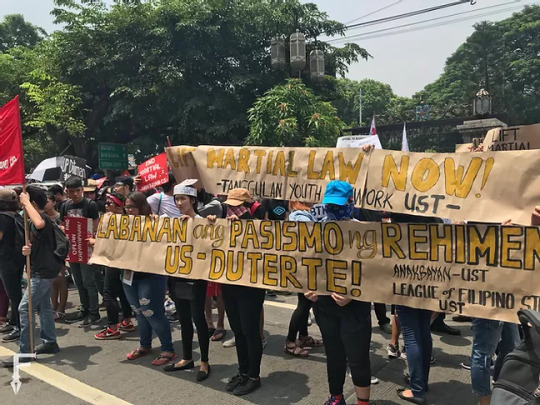
UST students place themselves at the forefront of rally participants.Photo by Dexter Tilo/THE FOURTH
Alias Francisco d’Anconia said, “Tingin ko compared sa mga mas matanda, mas may fire […] ‘yung youth. Yung mga matatanda medyo magdadahan-dahan pa to do things. Pero ‘yung youth ‘pag may sinabing may rally, andun sila. Yung youth laging na sa forefront.”
(The way I see it, compared to the elders, the youth has more fire. The elders think twice before doing things, but the youth, when a rally is set to happen, they are always at the forefront.)
d’Anconia was part of the first confetti movement, also known as the “yellow confetti rallies” in Makati during the regime of the late strongman Ferdinand Marcos.
d’Anconia, who was once a national council member of the Nationalist Alliance of Justice, Freedom and Democracy during the post-Aquino administration, shared the inside joke he and his friend has about the irony of what happened more than three decades ago and what is happening now.
“Hindi namin inisip na after 30 years, babalik kami sa lansangan [at] sisigaw ulit ng ‘Marcos, Hitler, diktador, tuta. After [31] years, pinabagsak na natin si Marcos noon, tapos babalik kami sa lansangan magsisigaw ulit ng ‘Marcos, Hitler.”
(We did not think that come 30 years, we would go back to the streets and chant ‘Marcos, Hitler, diktador, tuta’ again. [31] years ago, we ousted Marcos from his position, but here we are still and here we are again,” he narrated.
d’Anconia was part of the first confetti movement, also known as the “yellow confetti rallies”, the business’ sector’s response to the assassination of Marcos’ staunchest opponent, Benigno “Ninoy” Aquino. Shredded papers, preferably yellow, were thrown from the high-rise buildings in Makati.
d’Anconia’s view about the youth today was that they shaped not only this moment, but more importantly, the future. They were the ones who would reap the gains of what their predecessors fought for in the past. They had years ahead of them. They would be “involved not only in the government, but also in the everyday social and cultural life.”
He also warned about vigilance and readiness during this time because “bad news comes every day and unexpected things happen one after another.”
“Inaasahan naming yung youth talaga na ipagpatuloy niyo lang yung fire tapos andiyan naman kami sa tabi.
(We really expect the youth to continue the fire because we are always by their side),” d’Anconia noted.
Francisco d’Anconia is pseudonym adopted from the fictional character from the Atlas Shrugged movies. The character was an activist behind the playboy look who recruited great thinkers for the strike in the industrial world.
Published Sept 21, 2017 on THE FOURTH
LINK: https://thefourth3jrn2.wixsite.com/thefourth/single-post/2017/09/24/Martial-Law-activist-urges-youth-to-continue-their-%E2%80%98fire%E2%80%99
0 notes
Photo
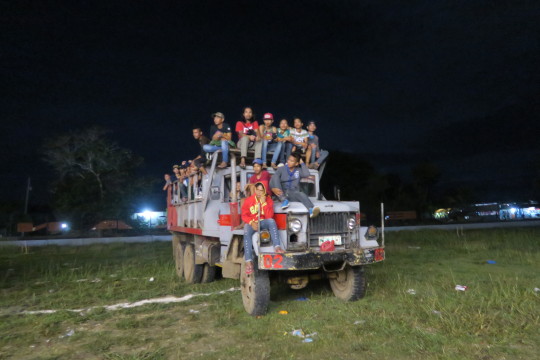
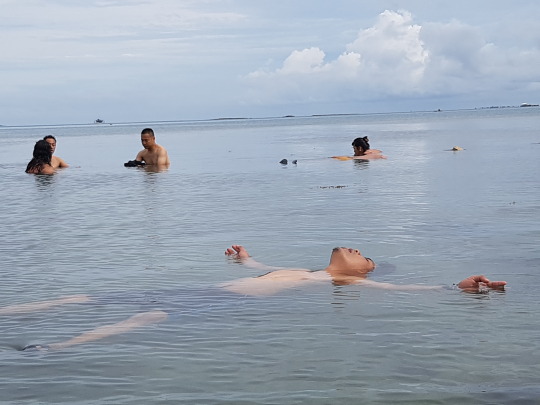

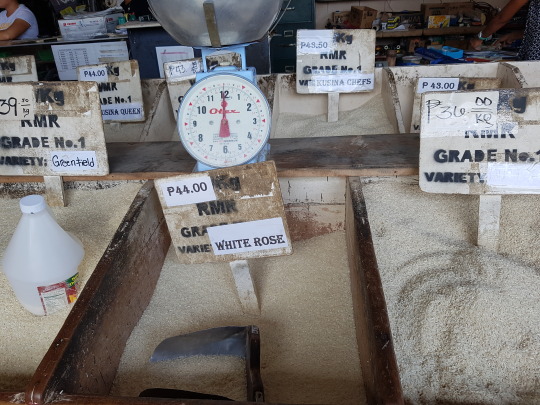
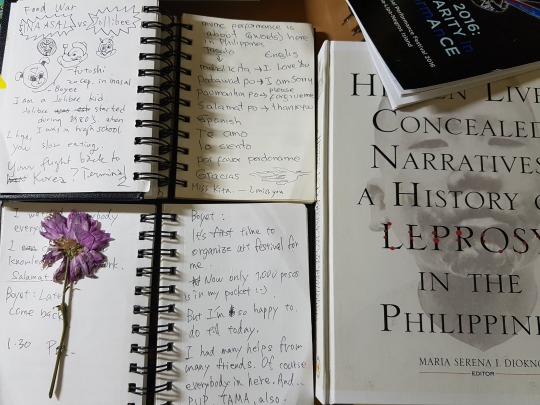
[ concealed narratives, hidden justice ]
written by Park, ju-young
Before leave in my country, I thought about philippines images is tropical fruits and scuba diving, korean’s hot place for honeymoon.. Additionally recently there often arises the murder koreans and drug crimes.. However, I decided to see the best of the Philippines than my fear of being wrong and I arrived in manila over four hours from south korea. Mr. Boyet had previously welcomed me at the airport who is the SIPA festival convener. And I had a celebration time as invitation of Mr. Bely who is director of Univ. center for culture and the arts in polytechnic univ. philippines with other artists from Mexico, Indonesia and Colombia and local artists in his office. Japanese artist arrived the next day. Performance in the Philippines is unique in that’s held in the school. The school is packed with students who showed strong enthusiasm for learning. In right there held an artist talk and performances. Of course the audience were also a lot of students and teachers. Each artist selected their place on campus area and expressed. There was free in liberty of expression for artists. And It was great know the works of local artists of philippines also foreign artist’s one. Used of tool is as follows; mango, text, song, candles, the packaging, news paper, book, clothing, white doves, coin, red cloth, tape, toothpaste, taco-snack, skeletons and with the nature of clay, fire, stone, water.. So we have expressed and shared variously as such including modern society and identity, poem of objects, protest, resistance, and our voices. Performance in Lipa held in front of pure students, too and after this performance we flew to bacolod of negros island from manila in the evening. Performance in Bacolod is also held at the La Salle University with lots of students. The next day, on sep 17, we did go to Escalante City, had a lot of experienced various in that place. The place was where On 20 Sep 1985, the bloodiest repression of the Martial Law Regime of Marcos happened in Escalante, Negros Occidental. It is also called Escam - shorthand for “Escalante massacre”, and sometimes Bloody Thursday. Also there is famous for sugar cane. There are a memorial monument in front of the collapsed ruins and marks of shorts. At that place we played our own guerrilla performance for the memorial. On the second day in escalante city, we had the big participation performance made a form of peace with audiences in the Coliseum theatre. And the last on Sep 20, there held a big event for re-enactment of the escalante massacre on Sep 20 1985. Of course the day before they held a variety of events on the eve of festival. After our parade, almost we came up to the stage, re-enactment started. Among the participants, very young children were expressed the reality more and more. So I found myself choking and then crying. As the same time, in Gwangju of south korea there was a pro-democratic resistance movement was anti-human massacre from the dictatorial powers on May 1980 and on June 1987 like the philippines massacre, so I knew it was similar to each other in painful history. So, in that shared a history of citizen’s movement for democracy, I was big good luck as Korean. While I participated solidarity, I felt that the philippines is with a pain such as colonial country was controlled mainly by the Spanish, US, Japan and violent martial rule was under president marcos. The dictatorship is so bad, but rather than rich and poor, isn’t there anyway we can happy and equal? But justice has not yet been served to the many victims. There are no answers anywhere. I was in the process of getting to know the history of their country and requires understanding and tolerance as an artist. In this world exist good and bad, we can not know when the war is going to end. Nevertheless, we have always opposed the war and cry for peace. Our team and other teams was participated in there gathered together, it was literally solidarity. In performance, when a person play individually is beautiful but when we do gathered together is more beautiful. Looking at the memorial ceremonies, it was possible in that all together, not by a person. It means that it can never be without anyone’s help. During in philippines for SIPA, i was so hardly in community with all of participants. But a lot of artists and volunteer, officer, farmers, participants wrote for my ear. So I knew I was not alone, and we have to help each other. Special thanks to all. Nevertheless I want keep go on with a note and a pen wherever i go to new another country~ Also thanks to Mr. Boyet and local participants related to festival for inviting me to philippines. The flowing clouds of sky in philippines is majestic. When in flight to my home, the shouts was still ringing in my ears.
“ bugas, bugas indi armas marcos, hitler, diktador, tuta~“
(rice, rice not guns And bugas bugas dili tergas that was the peasant worker shouting while marching on the street. marcos is like hitler, a dictator, tuta (puppy or could be like a puppet))
-Essay for SIPA on Sep 12~21 2016: Solidarity in performance
☆(I wrote without help of translator, So please correct the press me, if my grammar is mistaken..)
0 notes
Text
Prometheus Unbound: Analysis
by
Justine Matthew Cañaveras
Alleah Anne Bea
Rochelle Carillo
After reading and analyzing the said poem, it already gives us the idea that it is all about the unfair and injustice system of the government. As we go further in analyzing and reading the poem, to the first stanza until the last stanza. The four stanzas of the poem tells us about the different kind of dictatorship governmen, the first is about “Marcos”, second is to “Hitler” and third to a “Diktador” and lastly to “Tuta”.
The first stanza’s message does not really pertaining to Mars the planet or as a Greek god. It is “Mars shall glow tonight” and it literally means Martial Law, a law that Marcos declared. We think the writer wants to inform the people that they are not having a fair or equal justice. That the government violates the human rights.
The second stanza’s message states that the people were punished by just a flick of a gun by the authorities and it is said that they are in mad, wrath or rage phase. And because of this kind of government, the people remained to be silent because the government are controlling them and threaten them with a arsenal, just like in Hitler’s way of government.
The third stanza’s message states that the people must know what to do. They should be brave and not afraid of death. Its message tells the people to fight for what is right and just. Let them know what is the value of human rights. and if they really love the country they are going to do it wholeheartedly.
The fourth stanza’s message was about the victory part that narrates what happened. The people for their rights and democracy. That the government ended their unfair system of government. And by the help of God, and the courage of the people’s country to do the People’s Power Revolution. The Martial Law ended, and the people of the nation once again felt the sweetness and victory of democracy.
Sources:
n.d.). How to Construe and Convey Tone in Poetry. Retrieved from https://www.writingforward.com/poetry-writing/how-to-construe-and-convey-tone-in-poetry
Melendez, P. E. (1970, January 1). The Marcos-era Resistance Poem that Smuggled a Hidden Message into State Media. Retrieved from https://www.esquiremag.ph/long-reads/features/the-marcos-era-resistance-poem-that-smuggled-a-hidden-message-into-state-media-a1508-20180911-lfrm2
(n.d.). Poetry as a weapon for peaceful dissent. Retrieved from http://nine.cnnphilippines.com/life/culture/literature/2016/11/29/poetry-as-weapon.html
0 notes
Text
ANALYSIS PAPER #1
PROMETHEUS UNBOUND
Objectives:
To critically analyze the poem entitled “Prometheus Unbound”
To give an interpretation on what the poem really conveys us.
Author’s Background
Ruben Cuevas is just a pseudonym of the author real name who isJose F. Lacaba, more popularly known by his nickname Pete. He was born on November 25, 1945 in Cagayan De Oro but grew up in Pateros, Rizal. He is also a member of PAKSA “Panulat para sa Kaunlaran ng Sambayanan” which is composed mainly of writers of poets and the organization who clamored for social change in the early 1970s . He was a multi-awarded journalist, poet, author and screenwriter. He was a lecturer at the Universiy of the Philippines and the Ateneo De Manila University. He was a political prisoner from 1974 to 1976. Pete also had undergone under the martial rule .He wrote the “Prometheus Unbound” that has a hidden message but when the government found out about it . Lacaba was tortured and arrested by the Philippine Constulbary.
Analysis
“Prometheus Unbound” is a literary piece that people thought as a simple poem about Greek mythology however little did they know it employs something differently which is “MARCOS, HITLER, DIKTADOR, TUTA”. Ruben Cuevas, the author of the poem, fought just like Dr. Jose Rizal during Spanish colonization. He used his imaginative mind and a pen to oppose silently and secretly the Marcos governance. But what really is the message of the poem? Is it only about the opposition of Ruben to the Marcos regime? Or it entails something a much deeper thing?
The poem started with this line, “I shall never exchange my fetters for slavish servility. ‘Tis better to be chained to the rock than bound to the service of Zeus.” Back to the Greek mythology, Prometheus is a clever trickster, he tricked Hephaistos and Athena to stole fire which he gave as a gift to the human race. This act caused Zeus to severely punish him by assigning an eagle to eat his liver while he was chained to a rock. In connection, the "I" in the line which is Prometheus symbolizes the Filipinos while Zeus symbolizes Marcos and his government. Pete tells us that it is better to die than to serve Marcos.
“Mars shall glow tonight” when we read this line the “Mars shall glow” has the same rhyme with the word Martial law and it revealed to us that the Marcos regime, anomaly and corruption were started. “Artemis is out of sight.” We think that the Artemis mentioned in the poem is Justitia that represents the justice in our country. It entailed that justice fades, and chaos begins. “Rust in the twilight sky; Colors a bloodshot eye; Or shall I say that dust; Sunders the sleep of the just” The lines intended that the Martial law is destructive on the Filipinos previous peaceful and normal life.
“Hold fast to the gift of fire; I am rage! I am wrath! I am ire!; The vulture sits on my rock” this signified that the Filipinos crave for freedom because of injustice and persecution from Marcos governance which made them extremely angry. But left no choice because they are all under by the predatory person whom is the most powerful person that time. “Licks at the chains that mock; Emancipation’s breath; Reeks of the death, death, death.” This means that Marcos disappointed the Filipinos because as president he should be the one who takes care and protect his people. However, mockery and injustice were all started on him and he acted like Hitler. Filipinos were asking for freedom, but all of his deeds were against on what the people want.
The next stanza stated that “Death shall not unclench me……” which means that the Filipinos do not want others to rule over them especially when they knew that the actions are wrong and unethical. They are also brave and ready to fight for what is right and for what they love even it caused their death.
The last stanza of the poem conveyed that the best weapon of the Filipinos to succeed in eliminating Marcos abusive governance over our country is unity. If the stars form as one they created a beautiful constellation which is Orion just like the Filipinos if they act as one they will eventually succeed and achieve the freedom they longed for.
The poem didn’t seem to have anything to do with the Marcos Regime or the political situation in the country at first reading. The first letter of each line spell out a popular chant used in protests against martial law: “Marcos, Hitler,Diktador, Tuta”. Ferdinand Marcos the tenth president of the Philippines from 1965 to 1981. He ruled as a dictator under Martial law from 1972 to 1981. Adolf Hitler was a German politician who also initiated World war II in Europe During 1939. Marcos and Hitler have in common which is they both executed and perceived their enemies. He also murdered a Family political Rival .They are both consumed by their power . Critics charged Marcos and his regime with crimes like corruption and nepotism . He behaves in autocratic way so he was called a Dictator because of his dids..Tuta in english word is puppy which means “doormat” or “slave”. Marcos once a slave by the US government.
Therefore, “Prometheus unbound” is a poem that has a hidden meaning for the resistance movement against the dictators’ governance. The poems secretly give Filipinos a hint on what really is happening that time so that they find a way to stop the cruelty and injustice governance of the dictator. Also, Pete gave us an incredible message which is to fight for what is right even it the hardest thing to do. #Fight for what is right! # Fight for our freedom to anyone and everything that enslaved us.
0 notes
Photo
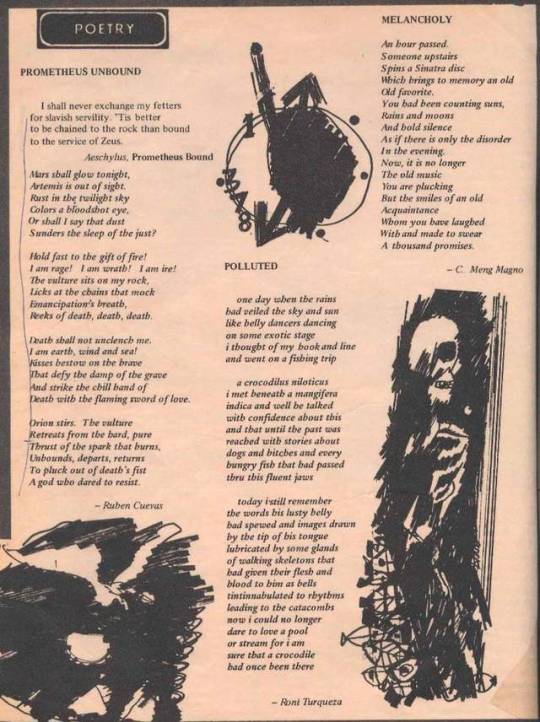
Ruben Cuevas’ brave Prometheus Unbound was a poem that was published during the era of Martial Law. Posing as an innocuous poem about the Greek Titan Prometheus that was published in the Marcos-approved Focus magazine, it was later revealed to be a piece of hidden protest material. When the first letter of each line is put together, it forms the acrostic message of Marcos, Hitler, Diktador, Tuta, a popular chant used in protests against the late dictator.
image credit: https://images.summitmedia-digital.com/newsroom/longform/images/2018/09/11/09112018-prometheus-unbound. jpg
0 notes
Text
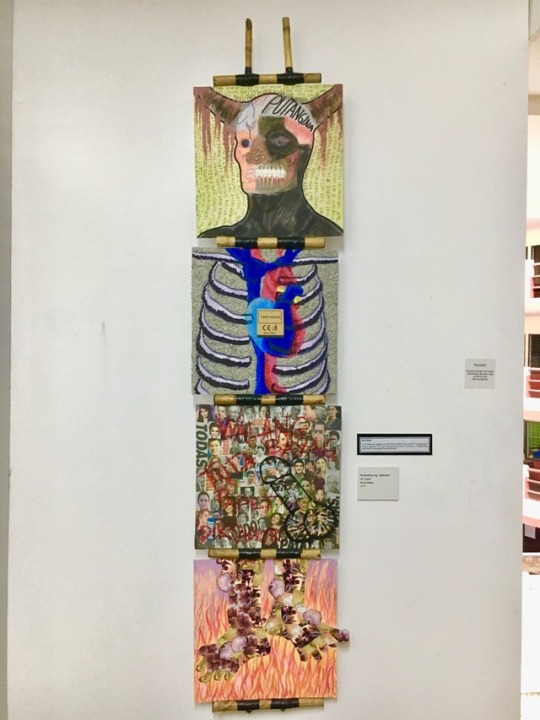
“Anatomiya ng Halimaw”
Anatomiya ng Halimaw was curated by MJ Rafal in which he’s a graduate in the Polytechnic University of the Philippines of courses and degree AB History and MA Filipino. He serves as a college instructor at the said university. His masterpiece is a mixed media fot it uses various types of materials to create such.
The artwork is displayed in 4 parts, connected by a bamboo stick for each division, that when fully viewed is a figure of a hybrid of a human being and a monster— has thorns with feet set on fire, unusual body sections and an appearance meant to give discomfort. As for my interpretation of Rafal’s masterpiece, I believe it’s more than just “monster” in itself, but a “monster” to Filipinos; whereas, this is an artistic form of those who have shown betrayal towards the Filipino’s faith and solidarity as a nation.
Starting from the feet, it can be seen that it is surrounded with fires and no extra gestures were executed. It is implied to me that the creature is already in hell and probably casually standing there. The reason why the monster is there will be clearly unraveled as we progresses the analysis. Next, above of it is the reproductive organ of a man with words saying “Walang Bayag”, “Tuta”, “Papet”, and “Diktador” with faces of the many personalities serving as a background. Here, it is implied to me that using of the male reproductive organ states something more of dominance, and that if we take closer look the top part of it is emphasized with the the two presidents (Duterte and Marcos) known for their draconian leadership. The faces of the many personalities, to me, represents those who are subscribers to the USA’s neocolonization for these personalities share those common factor, and they are the products of these organ. Third, we can see heart enclosed in a rib cage with a bar code sealed on it. To me, it sends a mesage that the heart of this monster have a price on where will his heart goes unto. We can also confirm that this monster is a Filipino for the color of his heart and its associated parts are red, blue, yellow, and white which represents the Philippine flag. Lastly, the head is a primarily black with different sections of it colored alternatingly to the color of the skin, a large word “Putangina” occupying the brain, nose reminiscent of someone in the higher chain in the Philippines, horns with guts hanging on it, and facts about hitler in the background. This to me implies the what the monster have on its mind. All of which are not morally right and good. He is someone with dark intentions. He is also someone who displays that he is a humanist even when he is not. All of these are the reasons why he is a monster, and forever will always be.
0 notes
Text
anyone else cry when they see a marcos on the senatorial list.
IMEE MARCOS, YOU AND YOUR FAMILY HAVE THE BLOOD OF THE FILIPINOS ON YOUR HAND. WE WILL NOT FORGET ARCHIMEDES TRAJANO. WE WILL NEVER FORGET THE 70S. WE WILL NEVER FORGET WHAT YOUR FAMILY DID.
MARCOS. HITLER. DIKTADOR. TUTA.
#mon daze#YOUR ENTIRE FAMILY SHOULD BE IN JAIL UNTIL THEY RETURN WHAT YOU STOL FROM JS#US*#YOU DESERVE TO BE IN JAIL NOT OUT HERE RUNNING#YOU KEEP GETTING AWAY WITH THE MONEY YOU STOLE.#BRIBING FILIPINOS WITH THE MONEY YOUR FAMILY STOLE#THIS INCLUDES BONG REVILLA TOO.
0 notes